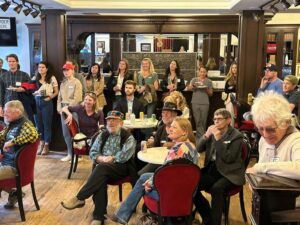In the fall of 2016, the Telluride Foundation staff took a deep dive into the demographics of our region. As we keep our ears to the ground and eyes open and were hearing stories of hardship, including the lack of mental health issues, struggles among immigrants, the inability for working families to find housing, the rising cost of child care, and the loss of jobs in the West End. Staff went to work – we researched current demographics and spoke with nonprofits and community members – to provide a better picture for ourselves and our donors of current community needs. Attached is a summary of stories, a spreadsheet of local demographics, and some diagrams that help to illustrate which organizations are currently addressing specific issues.
Our work is far from done, the Foundation will be taking the next six months to delve deeper into some of these issues, to have conversations with our donors, board members, and nonprofit grantees. With this information we will examine our priorities and how we can effect real and lasting change. As always, we welcome your thoughts and comments on how we can best represent your priorities and best serve our community.
1. The cost of living in Telluride is high— According to one middle-income family with two children, where one parent works at a school and one at a local business, the only way to make ends meet is renting a small subsidized employee housing unit, obtaining a scholarship for childcare, and driving to Montrose each week to buy groceries.
2. Access to affordable childcare is limited— Childcare is San Miguel County is the 7th least affordable county in the state, which can cost as much as 50% of a single mother’s income. In Telluride, there are currently 30 families who need infant care, with only 6 slots available. The lack of affordable, available childcare services is currently forcing families to either move or one parent must drop out of the workforce.
3. Mental health services are critical— Colorado’s suicide rate is the 7th highest in the nation, and San Miguel County has already experienced 7 suicides in 2016. In fact, the Telluride region sees about 6 times the number of suicides by firearms compared to the national average. This is a rate that is similar to other mountain towns such as Aspen.
4. Poverty is among us— In the West End School District, 59% of children qualify for Free & Reduced Lunch, as compared to 42.2% in Colorado. West End Family Link served 542 free meals during the summer to children, all of whom were below 200% of the Federal Poverty Level— targeting children who would have no access to free or reduced lunch during the summer. West End Family Link has now started a community food bank, serving those who live at 150% or below the poverty level.
5. Economic development is needed— The unemployment in the West End (Nucla, Naturita, Paradox) is at 15%—more than double the Telluride Region. This situation will only get worse with the impending closure of the Tri-State Power Plant. The community will directly lose 67% of its tax base and its primary source of high paying jobs. With the impact the closure will have on associated businesses, it will indirectly lose a total of 80% of its tax base.
6. Domestic Disputes— This year, through October 2016, the San Miguel Resource Center has helped a total of 183 clients. Of their total clients, 47 were Hispanic. This may seem like a high number (25% of domestic violence issues, while only 9.3% of the population in the Telluride region) however, according to SMRC, this reveals that the Hispanic population is much more open to receive help due to SMRC’s bi-lingual staff, and other programs targeting the Hispanic population—rather than actually facing more rates of domestic violence issues.
7. Hispanic Education— In the Telluride School District, the 2015 graduation rate for Hispanic students was 14.2% lower than the national average, and every student who did not pursue higher education in the school was Hispanic. In fact, two recent Hispanic recipients of a Telluride Foundation Education Scholarship exemplified the unique struggles often faced by immigrant students who come from a different education culture: one recipient never finished a final high school class and, thus, never attended college and the other dropped out of college during their first year.
[button title=”LEARN MORE” icon=”” icon_position=”” link=”https://telluridefoundation.org/wp-content/uploads/2017/01/Demographic-Data.DecBoardBook-002.pdf” target=”” color=”#008295″ font_color=”#fff” large=”0″ class=”” download=”” onclick=””]



